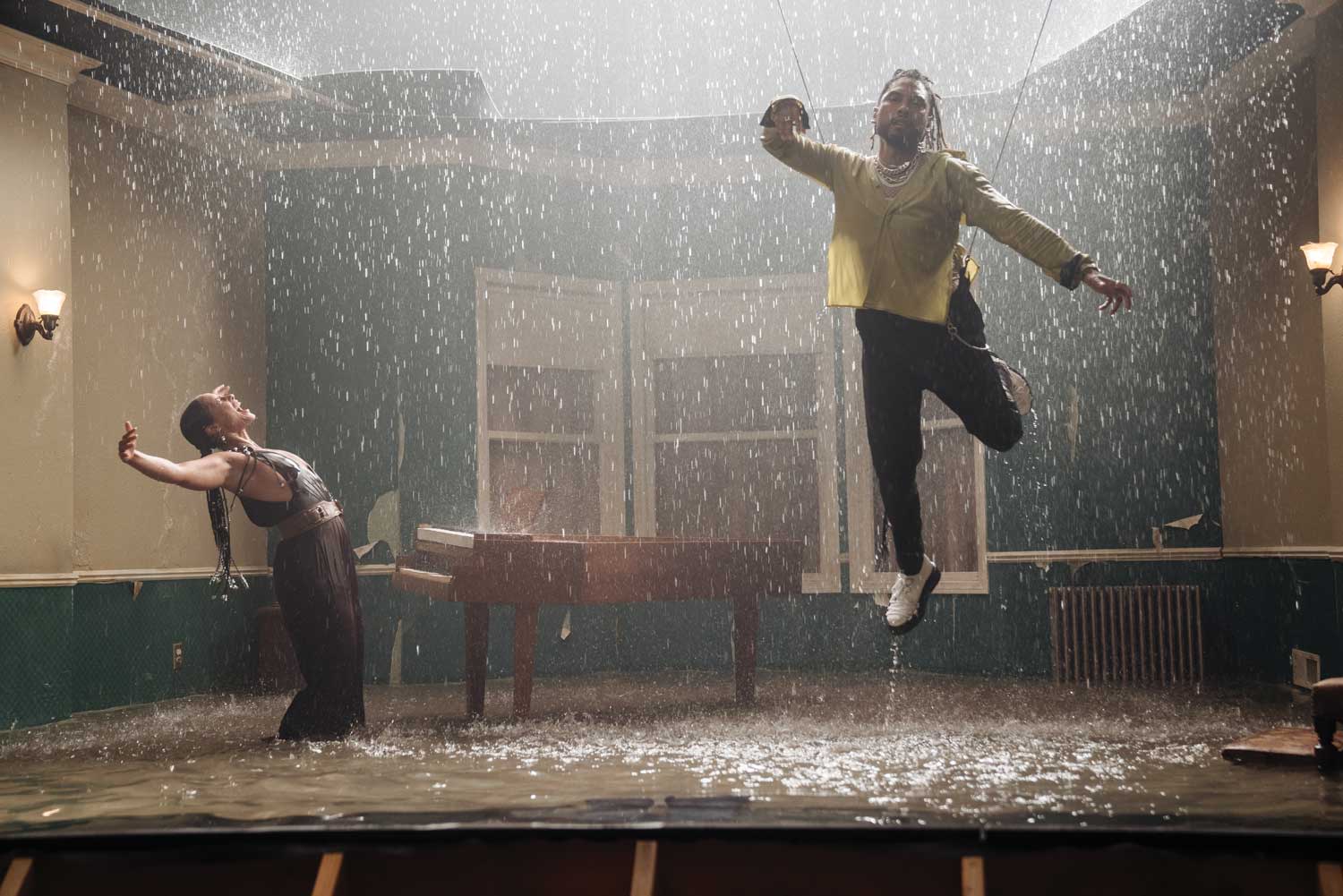In Conversation: Alicia Keys and Cara Stricker
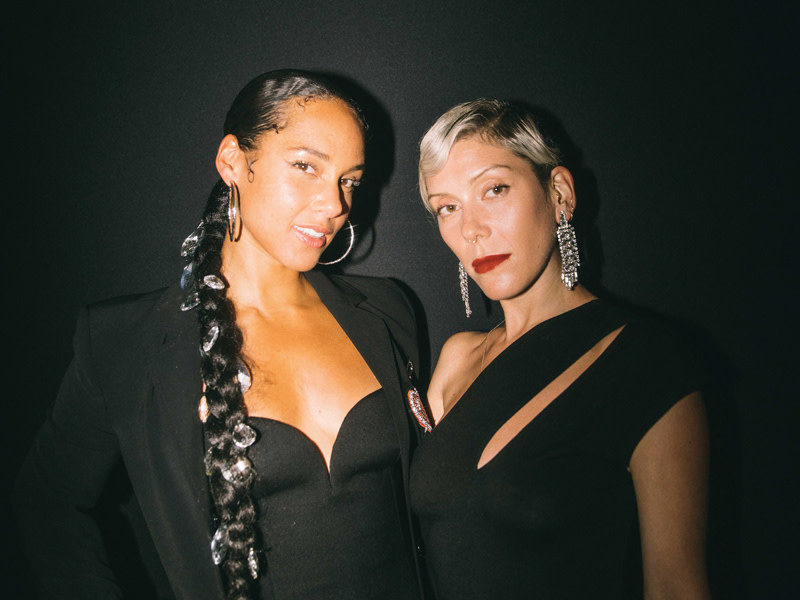
Alicia Keys is a 15-time Grammy® Award-winning singer, songwriter, producer, actress, author, entrepreneur and philanthropist. Cara Stricker is an Australian-born, US-based director, music producer and artist known for her work with Gucci, Vogue, Kelsey Lu and SZA, as well as co-founding PET, a platform for women filmmakers, musicians and artists.
Keys and Stricker first collaborated on the video experience for Show Me Love, starring Michael B. Jordan, Zoe Saldana and Marco Perego Saldana. The conversations had during this filmmaking process led into the discussion held for this article in February, 2020.
Alicia Keys: Hi everybody how we doing?!
Cara Stricker: Hey Alicia!
Chris Barker: Hello!!
Alicia Keys: My most beautiful Cara, thank you for waiting for me. I'm sorry this took so long, I wanted to do this in person because it's been so long!
Cara: We've both been so busy!
Alicia: But this is the time, and it's so exciting. I love this whole presence and everything we're talking about and I'm so happy to be here.
Cara: I've missed our conversations so this should be a fun one. Are you well?
Alicia: I'm very well. I'm healthy, I'm strong, I feel great, my family is great, the music is great. How about you?
Cara: I'm well! I'm in L.A, I haven't been here for a while. It's warm and nice. So should we kick this off?
Chris Barker: Yes, let's go. I wanted to start by creating some sort of definition around the nature of your collaborative relationship and how it relates to the conversation we're having now.
Cara: The project we worked on together was a music video, an installation and visual experience birthed over months and months of conversations and adaptation, talking about experiences in our lives in the hope that it would resonate with other people through art. We share a desire to explore our creative worlds through conversation.
Alicia: The first time we connected, we had so much magic. It was as if we were experiencing the exact same thing, even though we hadn't previously spoken about those experiences. I just thought it was so magnificent and so rare and you don't find that happening a lot but we were both so clearly connected to this idea of identity and this conversation of who we are and judgement and how we as human beings combat that. I found that to be a beautiful way to collaborate; instinctual and magical.
Cara: It felt like we were doing what we were meant to be doing, like the universe was aligned. We talk the same language which I don't feel like I can do with that many people, but once you connect with someone like that, you are living on the same plane as each other, which is rare.
We're here to talk about this word 'restless', which I feel we're having at a good time for you both. Cara, I know you just wrapped up a few big projects and Alicia you are just out of the studio after recording your new album and hosting the Grammys. What is that feeling like once you've completed a project? Are you immediately looking for another?
Alicia: It's like seasons. Sometimes there are seasons of great intensity where everything is just colliding at one moment; there is no break, no moment to breathe. There is a discipline of continuing to remain creative, and to remain in touch with the intuition of it all is actually the most difficult practice. [When you're] at the highest speed and at the collision of everything is when there is less silence and less downtime to have the clarity that's required of you. To me it's beautiful and it's hectic and it's scary and it's exciting and it's thrilling to see that season in its entire capacity.
Then there are other seasons where it does come down and it does get quiet and you are able to take a breather and just revere in whatever you just experienced or are in the completion of. And that in its own way has its own set of excitement and fear attached to it; even the ability to wind down and be more comfortable with the quiet and the silence and the lesser movement. It comes around like seasons or like waves, going from the highest of heights to moments that are really calm and smooth. To balance between them is the tricky part, and the fun part.
Cara: I love what you said about waves, that made a lot of sense. It's like you're in the sea and one project teaches you something and it leads you into the next thing, or one relationship teaches you the answers for whatever it is you're working on next. Those things you were talking about Alicia about the fears and the confidence and the extreme joy of a project, all those things come up and over as each project comes to a beginning, middle or end. You never know what's going to happen that day that will lead into your next project. For example after we did our film, I went into a personal project of writing an art film, then a feature film, but it wasn't as easy to tell when those moments of clarity would come. But when they do, you just have to dive deep in it with your instincts and be ok with the fact that you're floating on these waves, and the only constant is change.
Alicia: It's about the practice of it too.
Cara Stricker: Yeah, like meditation and running and the practice of when things are really busy or really quiet, that it doesn't throw you either way. That practice is the trickiest thing and it’s that process that has taught me so many lessons. Then we take those lessons into the next piece we are creating.
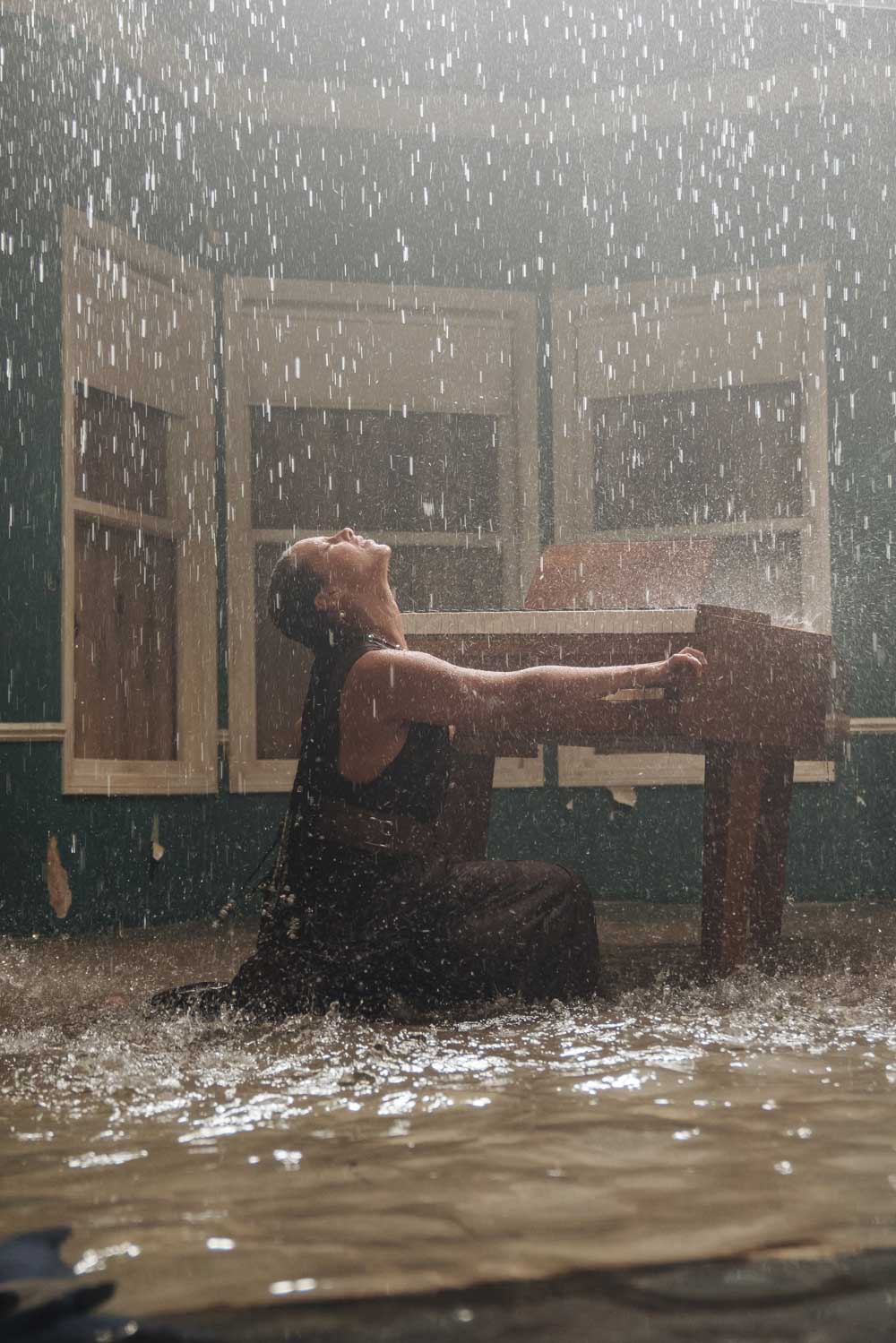
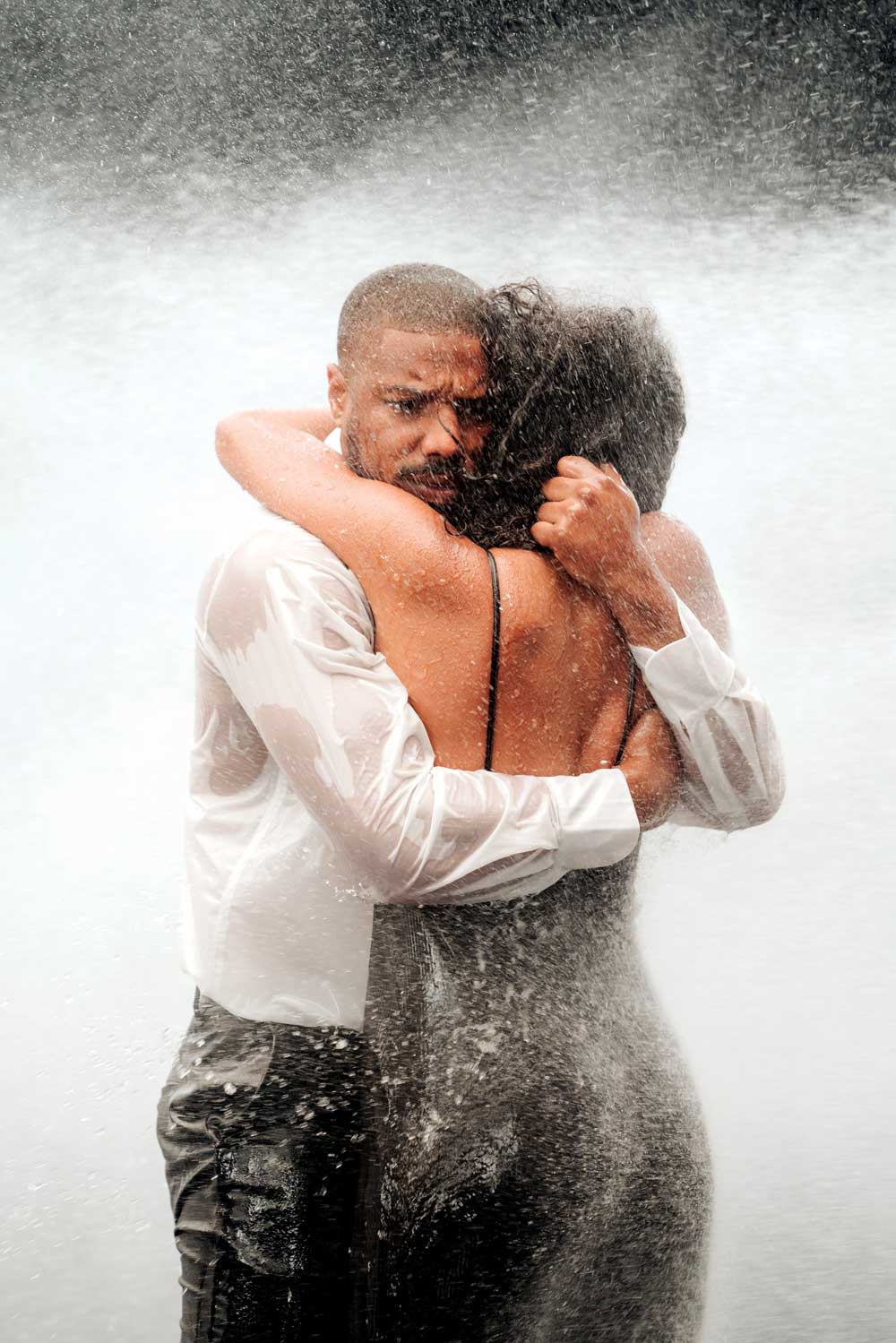
How have those motivations changed over time, from the beginning of your career to the level of success and choice you have now?
Cara: I don't feel like I've ever created for other people so much as I collaborate with people. The desire to create has been at the core and that's how I understand any project, much more than doing it as a means to an end. That has always been the driving force.
As I've gotten older, people ask 'how did you get into this?' I don't think there was any question of 'what's my way in here'—I just had to be making. Whether it was for me, or with someone, or for someone, it all came from a desire to understand the universe around me. This insatiable desire to have these conversations has been there ever since I was a little kid. But what changes is that you meet people who have had similar experiences to you. Alicia has had a crazy life, she just hosted the Grammys and recorded a new album, but still has this insatiable desire to create for no other reason than for expressing on a deeper level for yourself. Alicia, how do you feel about this?
Alicia: I love that. I really agree with you. It's this rare dichotomy as an artist because of course you want to relate to people. Part of what an artist hopes for is that they can say something that touches somebody. That's the reason one creates. And then another reason is a shared necessity, or a need to express themselves, or to make sense of something. And I think once you've experienced the side where you realise that your art has the power to touch people, there is another line that you are constantly balancing.
As you know, the most beautiful version of art is when you are able to honour yourself completely 100%; it's your journey, your emotion, your pain, and then you find out that other people have felt this too. There is something about that beautiful, spiritual connection that couldn't have happened through any other way but art. I agree with Cara in that I'm fortunate to have never had to create art because someone was telling me to or because I've wanted to please someone else or because I've had to follow the rules of someone else—and I could of easily done that! A part of acknowledging your success as an artist is that your work has touched someone, but it's a two-way street about the emotion itself and the ability to translate that emotion in a pure way.
I'm grateful that I've had the familiarity and individuality to honour who I am as a human and be that fully. But at the same time, artists are on a constant journey. You never know where you're going with it, and you never know where it's going to lead you, and you never know how you're going to get there. Part of the magic is that it's a surprise for you as well. And even if you know you did something that was important and special, there is prob- ably a large chance that it's not going to be as important and "special" as you thought it was.
But what does that mean—that you won't stop pushing or trying for it? There is a constant finding of yourself and a rediscovery of yourself and recommitment to the truth and what that means for you. And as for what defines success for you as an individual, well that changes all the time.
Cara: When you're able to take emotions like pain, heartbreak and love and create something that at least one person can relate to so they don't feel as alone in the world, you can literally help people just through a lived experience. It's why that restlessness of continuing when you're thinking 'what's the point of all this' is a really powerful and important thing to know. Even though a lot of this feels lonely, like when you're writing or making music, you make people feel like they're understood.
Alicia: Totally agree.
Cara: When I see that in art or hear it in music, it's like experiencing an emotion that I can't always tap into. It makes me feel validated and free in this way because you know you're not experiencing something alone. It becomes less scary.

When you were both growing up, who were the most valuable mentors to you? What type of lessons do you think are still valuable here and now?
Alicia: There were a lot of different mentorships that were valuable. Some of them were the people closest to me. For example, Clive Davis was a big mentor, but I didn't even realise the way he was mentoring me because I didn't understand the gravity of what he brought to the table until later. That happens a lot, you don't realise how mentors are helping you until much later. One of my first managers, Jeff Robertson, was a big mentor for me in multiple ways, having had more experience than me and ushering me into a world I had no awareness of. And there was a time, due to the nature of all relationships, of testing me without me even realising it because he made me decide what I wanted for myself. That's the other thing about mentorship, there is a part of it that is about learning what works for you and what you want to get out of things, and what I most appreciate about Jeff is that even though I was new in these meetings with big record label executives, he always sat me at the front of the table. He was teaching me to ask for what I wanted and that I could handle these high-level meetings.
Then there are like 'meeting' mentorships where you meet people who say things I would have never considered before, or even through just watching people I admire! Like Oprah Winfrey is someone to be admired and I always admired her because she operated from a place of love and about doing something powerful for humanity. I didn't know her at the time but she was a huge mentor because it showed me a woman could be a boss, could be at the top of her game, could completely create her own creative world and also give a fuck that people could be uplifted by it.
There are these levels of mentorship that happen just by essence of you standing in your truth, you mentor people without ever having met them because your essence teaches them something. Then there is the mentorship with hands on growth and learning and messages and lessons and time spent. There are multiple ways to men- tor and to be mentored.
Then for me in regards to mentoring the community and continuing to go forth in that spirit, I guess I work with that all the time both spiritually and energetically. There is a great imbalance that we need to bring back to the centre, where it's not so paternal but more maternal and it's not operated from a male headspace. We desperately need it because it's an imbalance, and it's an imbalance that's gone for too long. Witnessing that and helping more women to understand power and understand how we fit in to corporate America and how we fit into our own America that we want to build, [I want to make sure] there are opportunities for young women and young women of colour to enter these rooms we belong in and be at the heads of these companies that we belong in. These are the things on my mind and the things I want to continue to create for and bring to the forefront.
"[I want to make sure] there are opportunities for young women and young women of colour to enter these rooms we belong in and be at the heads of these companies that we belong in."
Cara: I love all of that. Mentorship growing up was through the people close to me, and having them support me standing for myself as a woman. My father very much mentored me to do the best work I could do. Even if I questioned that, I was in a position where people would support what I had to say without being afraid of it. That was really informative in what you were saying Alicia about how the world needs mentors who I as a woman can relate to and see women in power and that not being a thing specifically about gender.
I grew up in this world where a woman was seen in a very specific way and that to be in a position of power and in your own truth was not very 'feminine'. That has changed, now it's a very empowering, beautiful side of being a woman that I didn't have growing up. My manager today and the production company I'm with empower you not to feel like an imposter in the room but to step into the room and to think about your instincts and your gut and to go with it. That in turn mentored me to listen to myself, rather than to try and get validation from the outside.
Also, my family mentored me in how we loved each other. The basis of understanding why you're doing whatever you're doing in the world and staying true to that has always pushed me back to exactly where I should be. It's the most powerful feeling. There is no one who has been there my entire life and shaped the worthiness of my voice like my family.
Anyone who is creating needs to listen to themselves and just create and react to what's happening around them and feel that what they have to say is just as truthful as what the person next to them has to say. Society is starting to allow that to happen in a much bigger way for women and people of colour and people who are gender non-conforming, there is a platform to get your message out there. The only thing you need to do is stand in your own truth to set an example for other people to see, then encourage other people to do that in themselves. It breeds happiness and love between people which can create a beautiful environment for humans to live in.
"It's less about the project and more about who you want to be in the world."
Alicia Keys
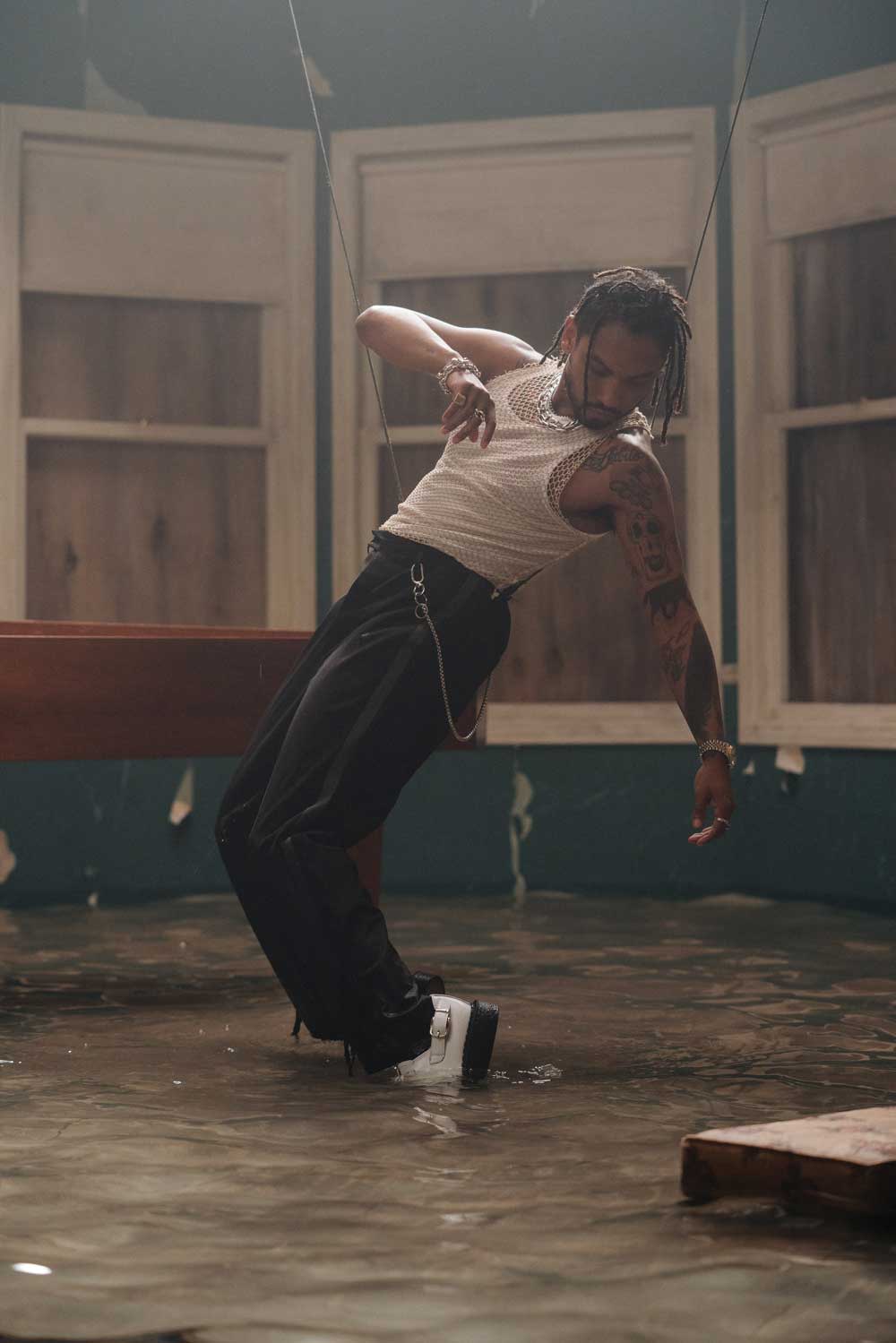
The word intuition has been bought up a few times here. How have you learned to trust yourself when it comes to creative projects? Oftentimes the person you are at the start of a project is so different to who you are at the end of it, that it is hard to say definitively when something is 'done', right?
Alicia Keys: It's less about the project and more about who you want to be in the world, period. That's a constant question and revaluation and the part of you that has to evolve.
For my book that's coming out, that had a very definitive ending because there is only so much you can talk about in this moment right now that relates to this feeling of authenticity and how you actually become who you are.
There is a definitive ending to the amount I can share at this point, although the concept itself is never-ending. That's what I mean in that it's bigger than one project, it's more about who you want to be in the world and what you want to put in the world. Through these projects you can express elements of that.
Then it's just good old fashion deadlines. Sometimes you get a deadline and you have to meet it and you have to trust you've done the best you can up until that moment. It's wonderful. But I love what you said about finding that place about being clear in what you want, that's the constant discovery and you will always be tested on it. For me, the best way to do that is to really be clear and take my time. I do that through meditation and I've noticed there is a difference in my clarity of mind and what I know is right in the moment and to be truthful of that vision I'm bringing forward. Mediation helps to be clear about that. Without it, I feel less clear and more influenced by what's going on around me. How about you, Cara?
Cara: Honestly, deadlines define the end of so many projects for me. I could keep tinkering on things forever because there is always more you could add. But I like to trust the process and to know when something is finished. My own personal projects are different to when I work with other artists. With most projects, it's like there is a box around what we're creating, and once you build the box the project is done. There is an intent and your instincts lead you into what's right about that specific box. But in my personal practice that box is always shift- ing, it becomes a sphere which starts to float. But I trust that's happening for a reason.
I grew up as a dancer and I've always felt things through my body and how it moves. When my body is moving in a specific way it usually feels right, and in that moment I know I've hit the right thing for myself. Whether it's in how much dialogue flows, or how an edit is flowing, or how a space is designed, it all goes back into the physicality of my body. So that clarity of work comes through making sure my body is clear; things like meditation, running, keeping yourself moving to keep feeling things. If that is out of whack I lose all instinct of where things should go. For instance, this feature I'm writing now could go on for years and years or finish in six months, but the process will keep changing until there is a dead- line and someone says “and we're done.” I mean, you've seen that on set Alicia, I can keep finessing tiny things forever. There are so many options, but when you have structure around your freedom there are great ways of finishing projects, and I love that. But it's a process that's always changing.
The structure needs to be there otherwise I could just create forever.
